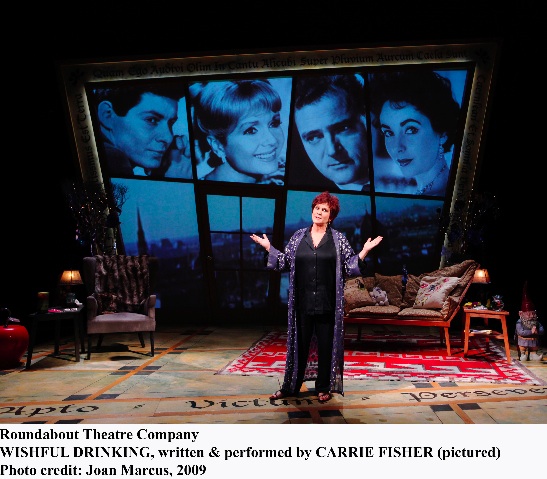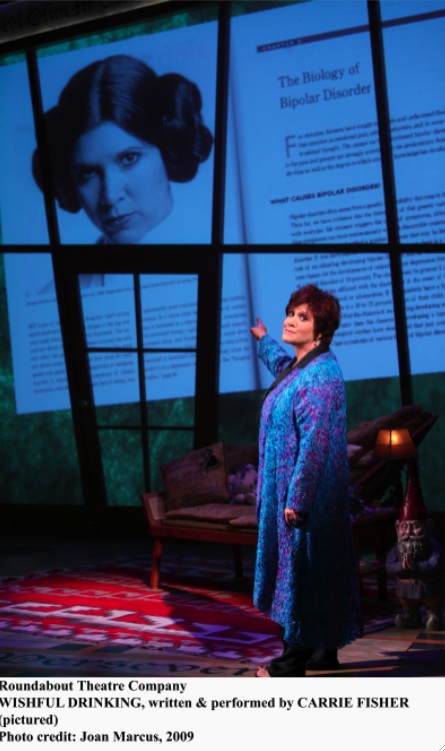Carrie Fisher has been called a lot of things in her life: an actress; an author; a screenwriter; a wife (she was married to musician Paul Simon and, briefly, to powerhouse talent agent Bryan Lourd, with whom she has a daughter); an alcoholic; bipolar; the Princess of Alderaan; and a product of Hollywood inbreeding (her parents are actress Debbie Reynolds and singer Eddie Fisher). Carrie's life is big and bold and she lives it big(ly) and boldly. It's also scary, joyous, painful, and funny as hell.
Over the past two years, Fisher has traveled around the country sharing her story in a setting where she probably feels most at home, on a stage. Pajama-clad and pacing back and forth between an easy chair and a couch on her living room set, Carrie immediately breaks the fourth wall to engage her audience in her one-woman show, Wishful Drinking. This is not your typical Broadway show, nor is it your typical life story. But as someone once told Fisher, "if you can claim things, they have less power over you." With Wishful Drinking, Carrie Fisher claims nearly everything.
Carrie talked to me about the process of bringing her life story to the stage, using the audience as her scene partner, and how, as long as she's performing her story, it will never stay the same.
What made now seem like the right time for you to tell your story? And, why the stage instead of, say, another movie?
I've been doing speeches all over the place. I enjoy doing that and connecting with people. And, film is a whole other beast and I've done enough of that, probably. But two of the things I like to do, which is writing and (I don't like singing performing necessarily) but I like performing. I like doing this [the show].

What was the most challenging part of the process of bringing your life to the stage as both a writer and a performer?
Both, really. You have to work on them. There's writing it and then seeing how it affects the audience when I perform it. So there are things that feel good when you're writing that won't perform well. Sometimes it's too articulated. Some of it needs to be more conversational and colloquial, so I play with words a little bit.
How has the past few years of performing "Wishful" changed the script? Are you continually editing it?
Yes. The piece changes a lot. I'm continually editing it ... basically it's the same, but I always like to improve it and work with it so it's always new for me. There's been a huge difference between what we started with in Los Angeles and what has evolved slowly over the last two years of doing this. If I'm doing it, it's not going to stay the same!
Has your blogging, Twittering and Google searching affected the shaping of the show we now see on Broadway?
I put in that little thing about someone saying I look like Elton John and stuff. I take things when someone insults me online and I usually answer it in material. I'll keep doing it if I find stuff, but I kinda know what they're going to make fun of me about, so I haven't been surprised in a while. They can say I'm fat, they can say, "who the fuck cares about celebrities talking about themselves so much?" I actually had a review that said that, so I put it in the show.
Is writing and performing Wishful Drinking a form of therapy for you?
Nothing's my real therapy. There are all sorts of things that you do to survive and get perspective on stuff. If I go on stage every night and act like I'm fine (even if I'm not) I will be. It has that kind of power.
I remember a line from the show where, when talking about being Bipolar, you comment that you could, "explode at any moment." Do you worry about that happening?
You mean that I have some kind of episode? Well, yeah. So I try to take care of myself so that doesn't happen. But sure, there's always a possibility!
How difficult was it to separate yourself from your life in order to tell this story both as a writer and performer?
Not difficult at all. I read a book that was about writers who feel like they have part of their person who is the writer and another part of their person that sort of has to take care of the writer. There's always someone who's in a separate watchful place, who doesn't participate in the show, just watches the rest of it go on. That's the part of the person who takes care of Carrie Fisher so she can do the show. I always felt there was a part of me a little detached from it. It's a way of staying safe when you're not so safe. It's good if you have something that's just to the left of things, not being so overwhelmed by them.
I read that you allowed your family to make any cuts of stories in which they appear. Did anyone take you up on that offer?
Yes! My mother was fine with it, my father was fine. Paul [Simon] wanted something taken out; Warren Beatty wanted something taken out. Like that. If anyone had a problem with any of it, I would take it out.
The audience participation is almost a form of its own shock therapy. As an audience, we don't expect a performer (pajama-clad, no less) to break that fourth wall, and to do so at the top of the show on a set that looks like a living room. Is that important to you? That the audience feels "at home?"
It's the most important thing. I don't like keeping a distance. The audience is sort of like my scene partner. So I have to kind of find out who they are while they figure out who I am. Because then it can be like you're in your living room, having a sort of chat with people, which is a lot more fun than having some kind of gulf between you and them.
Do you have plans for future incarnations of the show in other cities or countries?
We've done the show in LA, Washington, Hartford, Boston, Santa Fe, San Jose, twice in Berkeley, and Seattle. There's been interest in me doing it elsewhere, but there's been a question of when and where. I'd also like to take sometime off because I haven't had a vacation in a couple of years.
Was the book version of Wishful Drinking based on the material from a particular period of the show's development? There seem to be things in the book that didn't make it to the stage version ...
The book is based on what the show originally was. But then, if it had just been that, it wouldn't have been anywhere near long enough for a book. So I had to double it when I did that book (a year or so ago) so only part of that was what was originally in the show and the show has continued to evolved, as I have. [The book] is like the CliffsNotes of the show. I think the show is the ultimate sort of Gestalt going together. The book is like the libretto. Would you rather read the libretto or see the opera?
Despite the outrageousness of your life, you manage to transcend your very specific story and make it also seem so accessible to the audience. People can relate to it and recognize pieces of themselves ...
There is stuff in it that everyone can connect with. But I think a lot of the way people feel is, and I said this in an advertisement for the show, "You're going to really feel glad you have your life instead of mine."
You can find Wishful Drinking (somewhat ironically) at Studio 54 through January 3rd, 2010 or on the bookshelf of your local bookstore.